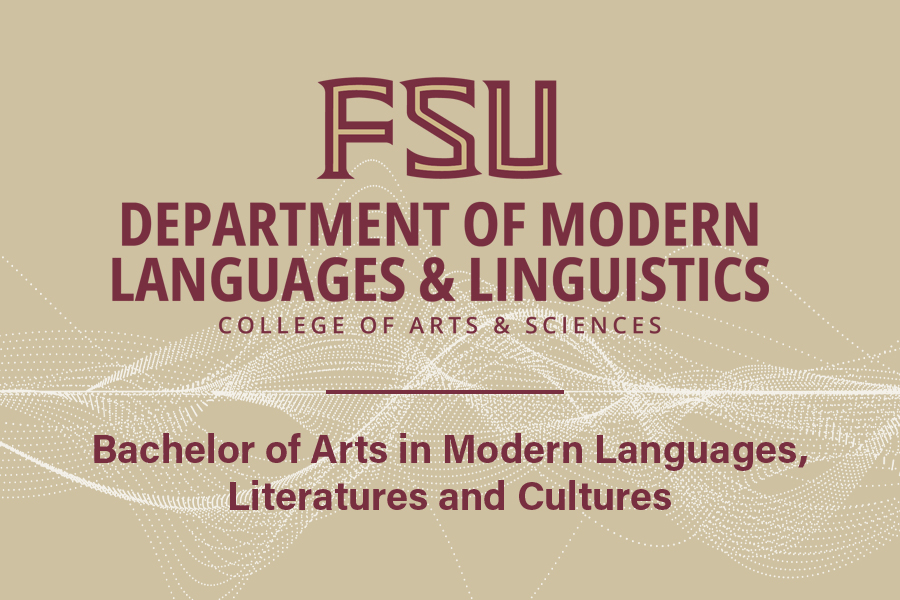
Florida State University has restructured and expanded upon its degree opportunities for students studying languages and linguistics, broadening graduates’ career prospects in fields such as foreign affairs, entrepreneurship, language teaching and the military.
This fall, the Department of Modern Languages and Linguistics will introduce two new majors and welcome its first cohort of undergraduates into the brand-new modern languages, literatures, and cultures degree program. Instead of earning a bachelor’s degree in a specific language, students can now receive a bachelor’s in modern languages, literatures, and cultures with a major in the language of their choosing. This reimagining of the traditional language degree addresses students’ evolving needs as they prepare for professional opportunities in a dynamic global economy.
“Student engagement in foreign languages, literatures, and cultures remains strong; however, we noticed their interests have shifted from the ‘traditional’ language major to tailored language proficiency and wider global cultural expertise,” said Reinier Leushuis, chair of the department. “We are adapting our curriculum to a rapidly changing world, meeting the demands of current students, and aligning with changing workforce needs.”
To increase the flexibility of individual students’ curriculum, those now earning a bachelor’s degree in modern languages, literatures, and cultures will be able to select a major in Chinese, French, German, Italian, Japanese, Russian, Spanish, dual languages, or world literature and cultural studies to specialize in that area. Currently enrolled students are able to complete their original degree track or switch to take advantage of the new offering.
The new major in world literature and cultural studies was specifically developed for FSU’s degree program and allows students to acquire proficiency in one foreign language while simultaneously focusing on the cultural significance of cultural artistic works and literary traditions in the countries where that language is spoken.
“In today’s globalized world, language skills — combined with cultural competence and intercultural communication skills — are in high demand for roles in sectors such as tourism, international business, diplomacy, education and the growing field of AI-related professions,” Leushuis said. “This new major reflects the degree program’s global cultural spirit and allows students to concentrate in one primary language while building a customized set of electives that focus on acquiring global cultural expertise.”
Through the new dual languages major, students looking to gain proficiency in two languages will have the opportunity to take high-level language courses tailored toward various career pathways such as translation, business and medicine.
“There is definitely a personal financial advantage to earning a degree in modern languages, literatures, and cultures,” said Gretchen Sunderman, associate chair for undergraduate studies and a professor of Spanish and linguistics. “It has been a team effort to create this new program and streamline the curriculum. While the degree is great on its own, there is also real value in combining it with a second major or degree in other areas, such as medical sciences, military science or political science.”
In the works since Fall 2022, the department’s restructured degree offerings have allowed FSU’s curriculum to reflect the demands of a continuously changing global workforce. According to a 2019 report by the American Council on the Teaching of Foreign Languages, nine in 10 U.S. employers rely on employees with language skills other than English. Further, research published in Forbes in 2023 reveals that multilingual employees earn an average of 19 percent more than their monolingual counterparts, and 40 percent of multilingual employees surveyed said their skills helped land their full-time job.
“Acquiring proficiency in foreign languages, literatures, and cultures enhances students’ ability to navigate and operate successfully in professional environments,” Leushuis said. “Studying languages fosters cross-cultural understanding, a valuable asset for wide ranging careers in entrepreneurship, diplomacy, foreign affairs, language teaching, translation, global trade, multinational corporations, the military and the national security sector.”
To learn more about the new degree program and a full list of undergraduate degree offerings in the Department of Modern Languages and Linguistics, visit mll.fsu.edu.



